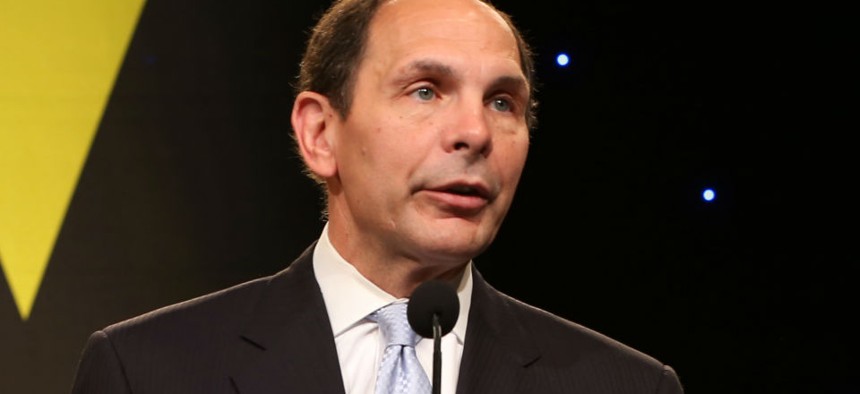
VA Secretary Bob McDonald has been touring the country meeting with veterans, employees and other stakeholders. Veterans Affairs Department
VA Chief Shares Recruitment Concerns, Reform Plan, and His Cell Phone Number
Bob McDonald wants everyone to know he really values transparency and feedback.
The head of Veterans Affairs on Monday acknowledged that he’s worried about the department’s ability to recruit and retain a talented workforce as it recovers from a major scandal and reinvents itself to better serve the country’s vets.
VA Secretary Bob McDonald said the department needs “tens of thousands” of new doctors, nurses and clinicians, and that he plans to sell VA’s “inspiring story” to medical schools and others across the country with the help of the media and members of Congress. He said he’s asked Florida Republican Jeff Miller and Vermont Independent Bernie Sanders, the respective chairmen of the House and Senate Veterans’ Affairs committees, to accompany him on recruiting trips.
“We have the [congressional] authorization for positions, the issue now is we have to find the people,” McDonald said. The secretary, confirmed by the Senate just over a month ago, outlined his 90-day plan for rebuilding trust with vets, improving services and creating a long-term reform strategy for the department, during a Washington press conference with reporters.
The controversial firing provisions in the new law Congress passed this summer could make recruiting difficult. The 2014 Veterans Access, Choice and Accountability Act, passed in response to several whistleblower allegations that VA employees falsified documents related to patient care, allows the department to fire and demote Senior Executive Service employees immediately, with paychecks getting cut off the day of the termination. The affected executive would then have seven days to issue an appeal to the Merit Systems Protection Board, which in turn would have 21 days for an expedited adjudication. MSPB’s ruling would be final.
Those measures seem to be “misunderstood or misinterpreted,” the secretary said. “It doesn’t allow VA to fire senior leaders without cause, nor does it guarantee that VA senior executives will be fired even if VA is seeking to remove them,” said McDonald. “What the new law does do, it does shorten the time that a senior executive proposed for removal by VA has to appeal VA’s decision. It doesn’t do away with the appeals process, or guarantee VA’s decision will be upheld on appeal.”
The West Point Academy graduate defended the department’s willingness to fire employees engaged in wrongdoing, but pointed out that personnel actions “require a level of respect” for those affected. “I want to make clear, when evidence of wrongdoing is discovered, we will hold employees accountable, and we will take action as quickly as the law and due process allows us to take,” he said. He noted that there are more than 100 ongoing investigations at VA facilities by several federal agencies.
McDonald, who urges VA employees to call him “Bob,” and freely gave out his cell phone number to reporters at Monday’s briefing, has vowed to make the department more transparent, less top-heavy, and more accountable to veterans and the public. “Accountability is more than just personnel actions; we must focus on sustainable accountability,” he said, defining sustainable accountability as ensuring all employees understand how their work supports the VA mission and requiring supervisors to provide daily feedback to workers.
“In that same spirit, we need to do a better job of training our leaders, flattening our hierarchical cultures, encouraging innovation and collaboration from the bottom,” McDonald said. “And we must realistically rate the performance of employees -- everybody can’t possibly be rated the best.” Former VA Secretary Eric Shinseki announced in May that no SES members at the Veterans Health Administration would receive a bonus this year.
The VA structure is “too complicated from the veteran’s standpoint,” McDonald said. For instance, the department has 14 different websites for vets to access services. “That’s just flat wrong,” McDonald said.
McDonald has been touring the country this summer, holding town hall meetings with employees, talking to veterans, union leaders, vets’ advocates and state and local government partners among others. “Everywhere I’ve gone I’ve found VA employees overwhelmingly dedicated to serving our veterans,” said the former CEO of Proctor & Gamble. Still, he also recounted some anecdotes from the “worst of the bureaucracy.” The VA sent a letter to one man, according to his son, asking him if he wanted to participate in VA health care. The man had died 20 years earlier and was buried by the department.
NEXT STORY: Finally, Some Good News for Federal Recruiters







